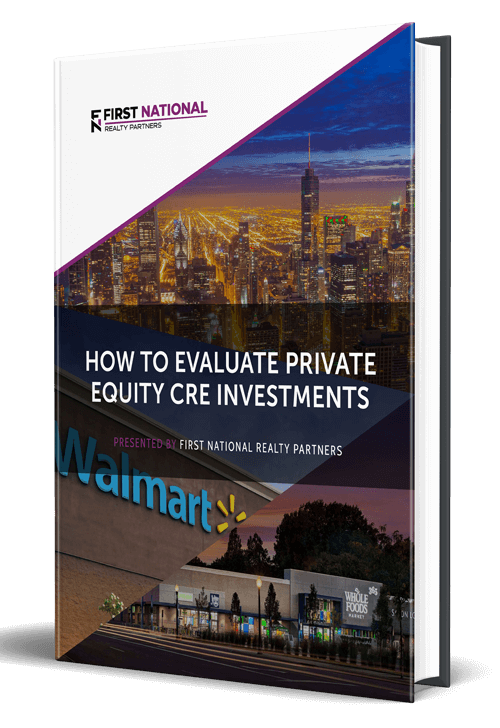By definition, commercial properties contain tenants who are contractually required to pay a certain amount of rent each month. The structure of these contracts, known as leases, can vary widely from one property to another and can have a significant impact on the profitability and desirability of the property.
In this article, we will discuss properties that have a specific type of lease structure known as a triple net lease. We will define what a triple net lease is, how they work, and the pros and cons of investing in a property with one. By the end, readers will have the information necessary to understand triple net lease opportunities and determine if a triple net leased property is a good fit for their individual real estate investment objectives.
At First National Realty Partners, we specialize in the purchase and management of grocery store anchored retail centers. On occasion, our properties contain tenants with triple net leases, which may be a good fit for certain investors. To learn more about our current investment opportunities, click here.
The Triple Net Lease Structure Explained
At a high level, commercial real estate leases can be grouped into two buckets: gross and net. The key difference between the two has to do with which party – the tenant or landlord – is responsible for the property’s operating expenses. An easy way to think about the difference is that a gross lease comes with an “all in” rate, while a net lease is more akin to an a la carte option.
Gross Leases
In a gross lease, the tenant pays one monthly rental rate and the landlord uses this income to pay for the property’s operating expenses. Tenants like this structure for its simplicity, but gross lease rates tend to be higher to account for the fact that they include operating costs. Property owners like gross leases because they can charge higher rates, but they are also exposed to the risk of rising operating costs because they are unable to pass them along to the tenant.
Net Leases
In a net lease agreement, the tenant pays a base monthly rental rate plus some portion of the property’s operating expenses, depending on the specific type of net lease structure. There are four types of net lease structures:
- Single Net Lease: In a single net lease, the tenant pays base rent plus one of the major operating expense categories, usually property taxes.
- Double Net Lease: In a double net lease, the tenant pays base monthly rent plus two of the major operating expense categories, usually property taxes and building insurance.
- Triple Net Lease: In a triple net lease, the tenant pays base monthly rent plus three of the major operating expense categories, usually property taxes, building insurance, and maintenance.
- Absolute Net Lease: In an absolute net lease, the tenant pays base monthly rent plus all of the operating expenses associated with running the property. This includes major repairs like replacing a roof or repaving a parking lot.
Of these four net lease structures, properties with triple net leases are particularly popular with a certain type of real estate investor who wants the benefit of owning commercial property, but not the hassle of managing it.
Triple Net Properties
In theory, any property could have a triple net lease (NNN lease), but they tend to be most common in retail spaces and office buildings. From a real estate investment standpoint, there is one specific type of net leased property that is very popular: single tenant properties with a great location and high profile occupants on long term leases. For example, imagine a retail center that has a standalone Starbucks as an outparcel. The Starbucks may prove to be very popular as a commercial real estate investment because it has a good location near a shopping center, a strong tenant, and a triple net lease.
Investing in Triple Net Properties
As described above, there are both benefits and risks with triple net lease investments.
Benefits of Investing in NNN Properties
There are many benefits to a triple net leased investment property, but we want to highlight five in this article:
- Passive Income: Because the triple net lease structure requires the tenant to pay real estate taxes, property insurance, and maintenance, the time burden of ownership is greatly reduced. This creates a passive income stream for investors.
- Long Term Leases: The types of triple net leased properties described above typically come with long term leases that can stretch up to 25 years, with multiple renewal options. Real estate investors like long term leases because they provide a stable stream of cash flow for a long period of time.
- Rent Increases: Within the length of the lease, there is often a clause that calls for contractually mandated rent increases at regular intervals. For example, the lease may require annual lease bumps of 1.5% or an increase of 3% every three years.
- Credit Tenants: Single tenant, triple net leased properties often come with tenants that have a strong credit rating. For example, companies like Walgreens, CVS, McDonalds, or Dollar General often like to utilize the triple net lease structure. These tend to be the best triple net lease tenants because they are large, publicly traded companies that are financially strong. As a result, they present reduced credit risk for investors.
- Exit Opportunities: Because single tenant, net lease properties are popular with investors, they tend to sell faster and for price premiums. This means that investors have a greater chance for a profitable outcome.
While these benefits can be significant, they should also be weighed against the risks of a triple net leased property.
Risks of Investing in NNN Properties
As it relates to this article, there are three triple net lease risks that deserve mention:
- Cost: The flip side of profitable exit opportunities is that triple net lease properties tend to sell for low cap rates, which means that they are expensive and may have a somewhat limited upside.
- Vacancy Risk: Single tenant properties are either 100% occupied or 0% occupied. So, if a tenant decides not to renew their lease, a property’s rental income could be reduced to $0 overnight.
- Repurpose Risk: Single tenant properties also tend to be purpose built for the tenants that occupy them. This is a benefit while the tenant occupies the space, but it can become a risk once they move out because it can be very difficult and/or costly to renovate the space for a new tenant. For example, a free-standing Walgreens store could be very difficult and expensive to repurpose for a restaurant tenant.
For those investors that are comfortable with the risk/return profile of a triple net leased investment opportunity, there are several ways to invest in commercial real estate.
How to Invest in a Triple Net Leased Property
Broadly, the options for triple net lease investments fall into two categories: public and private.
Public Investment
Going down the public path presents investors with an opportunity to invest in real estate investment trusts (REITs) that specialize in the ownership and management of triple net leased assets. For example, National Retail Properties and W.P. Carey are both publicly traded REITs that provide investors with access to triple net leased properties. While this commercial real estate investment strategy provides investors with the liquidity of a publicly traded security, it doesn’t provide them with any say in how their capital is allocated.
Private Investment
In a private investment, an investor could buy a property on their own, but this is a very competitive space. As a result, it may be a better idea for individuals to work with an experienced investment sponsor like a private equity firm.
Working With a Triple Net Advisor
An experienced real estate advisor, like a private equity firm, is beneficial because they provide investors with domain specific expertise and access to institutional quality triple net leased real estate properties through their established network of tenant and broker relationships. Investors interested in working with a private equity firm should perform their own due diligence on the firm, their track record, their investment philosophy, their investment offerings, and their fee structure to ensure it is a good fit for the investor’s own objectives.
Conclusions on Investing in Triple Net Lease Properties
- A triple net lease is a type of commercial real estate lease agreement that requires the tenant to pay base monthly rent plus their share of the property’s taxes, insurance, and maintenance.
- It is possible to find this type of lease structure in any property, but triple net leases tend to be most common in retail spaces and office buildings.
- The benefits of investing in a triple net leased property include high quality tenants, long term leases, rent increases, passive income, and profitable exit opportunities.
- The best triple net lease tenants have a strong credit rating and are often large, publicly traded companies. As a result, they present reduced credit risk for investors.
- However, triple net leased properties can also be very expensive. And, they may come with a higher degree of vacancy risk (for single tenant properties) and repurpose risk.
- For real estate investors who are comfortable with the risk/return profile of a triple net leased investment, they can invest in the shares of a publicly traded REIT, buy the property themselves, or partner with a private equity firm.
- For individual real estate investors, partnering with a private equity firm can be beneficial because it provides them with access to institutional quality triple net lease deals that they would likely not be able to afford on their own.
Interested In Learning More?
First National Realty Partners is one of the country’s leading private equity commercial real estate investment firms. With an intentional focus on finding world-class, multi-tenanted assets well below intrinsic value, we seek to create superior long-term, risk-adjusted returns for our investors while creating strong economic assets for the communities we invest in.
If you are an Accredited Real Estate Investor and would like to learn more about our investment opportunities, contact us at (800) 605-4966 or info@fnrpusa.com for more information.






